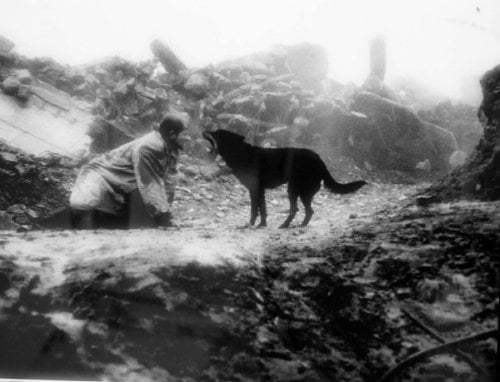Damnation

Laura's Review: B+
In his first work with writer friend László Krasznahorkai, the Béla Tarr most known to today's art house audiences emerges. Beginning with a long, slow tracking shot of a coal transport gondola being viewed by a man from his window, we immediately note a director in complete control. The scene is meticulously composed, the camera moving ever so slowly to reveal a point of view from behind its subject, the sound of the carts chinking over track links methodical and oppressive. Mihály Vig's mournful score will reverberate through future films. The tale is a fairly straightforward love triangle under Communist rule that adds another layer of betrayal to the mix. Karrer (Miklós Székely B., "Hanussen") lusts after a singer (Vali Kerekes) at the Titanik bar who sings of loss. She's willing to be with him until her husband, Sebestyén (György Cserhalmi, "Mephisto," "Kontroll") returns from his latest smuggling job. Willarsky (Gyula Pauer), the bartender (he and his bar reappear in "Werckmeister Harmonies"), offers them a job transporting black market goods. Later he tells Karrer that his delivery was 'light,' accusing Sebestyén of sticky fingers. The Titanik's cloakroom attendant (Hédi Temessy, "Almanac of Fall") gives Karrer unheeded advice, later appearing in the rain to quote the Bible like some kind of lost Guardian from "Wings of Desire." The precision of Tarr's direction is perhaps most evident in the famous tracking shot of a row of connected buildings (also present in "Werckmeister Harmonies"). The camera notes the changing texture of the wall which breaks three times to reveal a tableaux of human misery. A man tap dances in the rain. Krasznahorkai introduces his first animal motif as packs of stray dogs wander through the village streets. At times, the film's portentousness almost becomes a parody of itself, but the film's climatic bark off between Karrer and a junkyard dog is not one of them. "Damnation" is a mesmerizingly bleak film.
Robin's Review: B
Matthew McConaughey has proved to be one of the most versatile character actors in the movie business, today, and he enters the realm of the extremely physically challenging role-playing, like Christian Bale in “The Machinist.” Ron is in the early stages of the AIDS virus and has lost a lot of weight. But, since he is straight as an arrow sexually, he knows that he cannot have AIDS. Once he accepts his fate, the always conniving Woodroof tries to get into FDA trials for a new drug that shows promise. When he is told that he cannot be guaranteed to get the drug of hope, the con artist figures out a way to get the drug by illegal means. He thinks that all is well and he is on his way to recovery when he collapses yet again. He is told by a compassionate doctor, Eve Saks (Jennifer Garner), that the drug is toxic and sets off to find non-FDA sanctioned AIDS cocktails. This is where the story gets its pace as Ron begins his fight for the right to live, even if it means taking drugs that the American bureaucracy of the FDA does not recognize as approved. The enterprising Woodroof turns to the less strict Mexico to purchase new, less dangerous treatments for AIDS and meets a disgraced American doctor (Griffin Dunne) who agrees to supply whatever Ron needs. Ron, of course, assures the immigration officials at the border that the many boxes of drugs are for his personal use. He lied. This begins a years’ long resistance by Woodroof and his trans-gender assistant, Rayon (Jared Leo), against the FDA and the regulations that prohibit a person certain to die to try anything that may prolong his or her life but is not US government certified. Soon, though, Ron sees a loophole in the law. Instead of selling the drugs to AIDS patients directly and enduring FDA bullying, Ron has the brilliant idea to form a legally allowed club where the membership fee (a whopping $400/month in 1985 dollars) get that member all the anti-AIDS drugs they need and circumvent the antiquated laws. Thus, the Dallas Buyers Club is born. This unlikely story is based on the real Ron Woodroof and his fight to live beyond the 30 days he was told he had left. The tenacious Woodroof will not take “you cannot do that” as an answer and dispels the doctors’ opinions and lives for seven more years. McConaughey, who must have lost 50 pounds or more to play Ron Woodroof, gives a riveting performance, both physically and emotionally. His near equal is Jared Leto as street-wise, trans-gender AIDS victim Rayon (nee Raymond). I can see best actor and supporting actor awards consideration for both of these performances. Canadian-born director Jean-Marc Vallee wraps himself around Ron’s story about one man’s fight against the system and makes you feel you are deep in the heart of Texas. He elicits fine performances form all, except for Steve Zahn’s character, a cop who is Ron’s friend but, though third billed, is hardly in the film. The production is solid on all levels.

